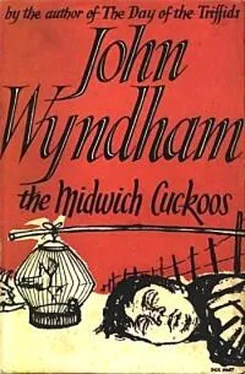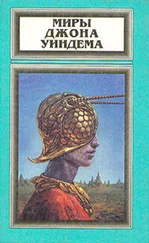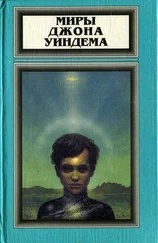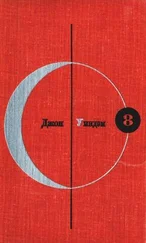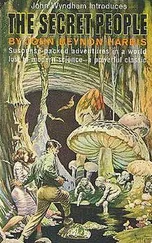Джон Уиндем - Consider Her Ways
Здесь есть возможность читать онлайн «Джон Уиндем - Consider Her Ways» весь текст электронной книги совершенно бесплатно (целиком полную версию без сокращений). В некоторых случаях можно слушать аудио, скачать через торрент в формате fb2 и присутствует краткое содержание. Жанр: Фантастика и фэнтези, на английском языке. Описание произведения, (предисловие) а так же отзывы посетителей доступны на портале библиотеки ЛибКат.
- Название:Consider Her Ways
- Автор:
- Жанр:
- Год:неизвестен
- ISBN:нет данных
- Рейтинг книги:5 / 5. Голосов: 1
-
Избранное:Добавить в избранное
- Отзывы:
-
Ваша оценка:
- 100
- 1
- 2
- 3
- 4
- 5
Consider Her Ways: краткое содержание, описание и аннотация
Предлагаем к чтению аннотацию, описание, краткое содержание или предисловие (зависит от того, что написал сам автор книги «Consider Her Ways»). Если вы не нашли необходимую информацию о книге — напишите в комментариях, мы постараемся отыскать её.
Consider Her Ways — читать онлайн бесплатно полную книгу (весь текст) целиком
Ниже представлен текст книги, разбитый по страницам. Система сохранения места последней прочитанной страницы, позволяет с удобством читать онлайн бесплатно книгу «Consider Her Ways», без необходимости каждый раз заново искать на чём Вы остановились. Поставьте закладку, и сможете в любой момент перейти на страницу, на которой закончили чтение.
Интервал:
Закладка:
The flower beds had shown me already that it was spring, and now I was able to look on healthy pastures, and neat arable fields already touched with green; there was a haze like green smoke along the trim hedges, and some of the trees in the tidily placed spinneys were in young leaf. The sun was shining with a bright benignity upon the most precise countryside I have ever seen; only the cattle dotted about the fields introduced a slight disorder into the careful dispositions. The farmhouses themselves were part of the pattern: hollow squares of neat buildings with an acre or so of vegetable garden on one side, an orchard on another, and a rickyard on a third. There was a suggestion of a doll's landscape about it — Grandma Moses, but tidied up and rationalized. I could see no random cottages, casually sited sheds, or unplanned outgrowths from the farm buildings. And what, I asked myself, should we conclude from this rather pathological exhibition of tidiness? That I was a more uncertain person than I had supposed, one who was subconsciously yearning for simplicity and security? Well, well — .
An open lorry which must have been travelling ahead of us turned off down a lane bordered by beautifully laid hedges, towards one of the farms. There were half a dozen young women in it, holding implements of some kind: Amazons, again. One of them, looking back, drew the attention of the rest to us. They raised their hands in the same sign that the others had made, and then waved cheerfully. I waved back.
Rather bewildering, I thought. Amazons for domination and this landscape, for passive security; the two did not seem to tie up very well.
We trundled on, at our unambitious pace of twenty miles an hour or so, for what I guessed to be three-quarters of an hour, with the prospect changing very little. The country undulated gently and appeared to continue like that to the foot of a line of low, blue hills many miles away. The tidy farmhouses went by with almost the regularity of milestones, though with something like twice the frequency. Occasionally there were working parties in the fields; more rarely, one saw individuals busy about the farm, and others hoeing with tractors, but they were all too far off for me to make out any details. Presently, however, came a change.
Off to the left of the road, stretching back at right angles to it for more than a mile, appeared a row of trees. At first I thought it just a wood, but then I noticed that the trunks were evenly spaced, and the trees themselves topped and pruned until they gave more the impression of a high fence.
The end of it came to within twenty feet of the road, where it turned, and we ran along beside it for almost half a mile until the car slowed, turned to the left and stopped in front of a pair of tall gates. There were a couple of toots on the horn.
The gates were ornamental, and possibly of wrought iron under their pink paint. The archway that they barred was stucco-covered, and painted the same color.
Why, I inquired of myself, this prevalence of pink, which I regard as a namby-pamby color, anyway? Flesh color? Symbolic of an ardency for the flesh which I had insufficiently gratified? I scarcely thought so. Not pink. Surely a burning red — I don't think I know anyone who can be really ardent in a pink way — .
While we waited, a feeling that there was something wrong with the gatehouse grew upon me. The structure was a single-storey building, standing against the left, inner side of the archway, and colored to match it. The woodwork was pale blue, and there were white net curtains at the windows. The door opened, and a middle-aged woman in a white blouse-and-trouser suit came out. She was bare-headed, with a few grey locks in her short, dark hair. Seeing me, she raised her hand in the same sign the Amazons had used, though perfunctorily, and walked over to open the gates. It was only as she pushed them back to admit us that I suddenly saw how small she was — certainly not over four feet tall. And that explained what was wrong with the gatehouse: it was built entirely to her scale — .
I went on staring at her and her little house as we passed. Well, what about that? Mythology is rich in gnomes and "little people," and they are fairly pervasive of dreams, too, so somebody, I am sure, must have decided that they are a standard symbol of something, but for the moment I did not recall what it was. Would it be repressed philoprogenitiveness, or was that too unsubtle? I stowed that away, too, for later contemplation and brought my attention back to the surroundings.
We were on our way, unhurriedly, along something more like a drive than a road, with surroundings that suggested a compromise between a public garden and a municipal housing estate. There were wide lawns of an unblemished velvet green, set here and there with flower beds, delicate groups of silver birch, and occasional, larger, single trees. Among them stood pink, three-storey blocks, dotted about, seemingly to no particular plan.
A couple of the Amazon types in singlets and trousers of a faded rust-red were engaged in planting out a bed close beside the drive, and we had to pause while they dragged their handcart full of tulips on to the grass to let us pass. They gave me the usual salute and amiable grin as we went by.
A moment later I had a feeling that something had gone wrong with my sight, for as we passed one block we came in sight of another. It was white instead of pink, but otherwise exactly similar to the rest — except that it was scaled down by at least one-third — .
I blinked at it and stared hard, but it continued to seem just the same size.
A little farther on, a grotesquely huge woman in pink draperies was walking slowly and heavily across a lawn. She was accompanied by three of the small, white-suited women looking, in contrast, like children, or very animated dolls; one was involuntarily reminded of tugs fussing round a liner.
I began to feel swamped: the proliferation and combination of symbols was getting well out of my class.
The car forked to the right, and presently we drew up before a flight of steps leading to one of the pink buildings — a normal-sized building, but still not free from oddity, for the steps were divided by a central balustrade; those to the left of it were normal, those to the right, smaller and more numerous.
Three toots on the horn announced our arrival. In about ten seconds half a dozen small women appeared in the doorway and came running down the right-hand side of the steps. A door slammed as the driver got out and went to meet them. When she came into my range of view I saw that she was one of the little ones, too, but not in white as the rest were; she wore a shining pink suit like a livery that exactly matched the car.
They had a word together before they came round to open the door behind me, then a voice said brightly: "Welcome, Mother Orchis. Welcome home."
The couch, or stretcher, slid back on runners, and between them they lowered it to the ground. One young woman whose blouse was badged with a pink St. Andrew's cross on the left breast leaned over me. She inquired considerately: "Do you think you can walk, Mother?"
It did not seem the moment to inquire into the form of address. I was obviously the only possible target for the question.
"Walk?" I repeated. "Of course I can walk." And I sat up, with about eight hands assisting me.
"Of course" had been an overstatement. I realized that by the time I had been heaved to my feet. Even with all the help that was going on around me it was an exertion which brought on heavy breathing. I looked down at the monstrous form that billowed under my pink draperies, with sickly revulsion and a feeling that whatever this particular mass of symbolism disguised, it was likely to prove a distasteful revelation later on. I tried a step. "Walk" was scarcely the word for my progress. It felt like, and must have looked like, a slow series of forward surges. The women, at little more than my elbow height, fluttered about me like a flock of anxious hens. Once started, I was determined to go on, and I progressed with a kind of wave-motion, first across a few yards of gravel, and then, with ponderous deliberation, up the left-hand side of the steps.
Читать дальшеИнтервал:
Закладка:
Похожие книги на «Consider Her Ways»
Представляем Вашему вниманию похожие книги на «Consider Her Ways» списком для выбора. Мы отобрали схожую по названию и смыслу литературу в надежде предоставить читателям больше вариантов отыскать новые, интересные, ещё непрочитанные произведения.
Обсуждение, отзывы о книге «Consider Her Ways» и просто собственные мнения читателей. Оставьте ваши комментарии, напишите, что Вы думаете о произведении, его смысле или главных героях. Укажите что конкретно понравилось, а что нет, и почему Вы так считаете.
